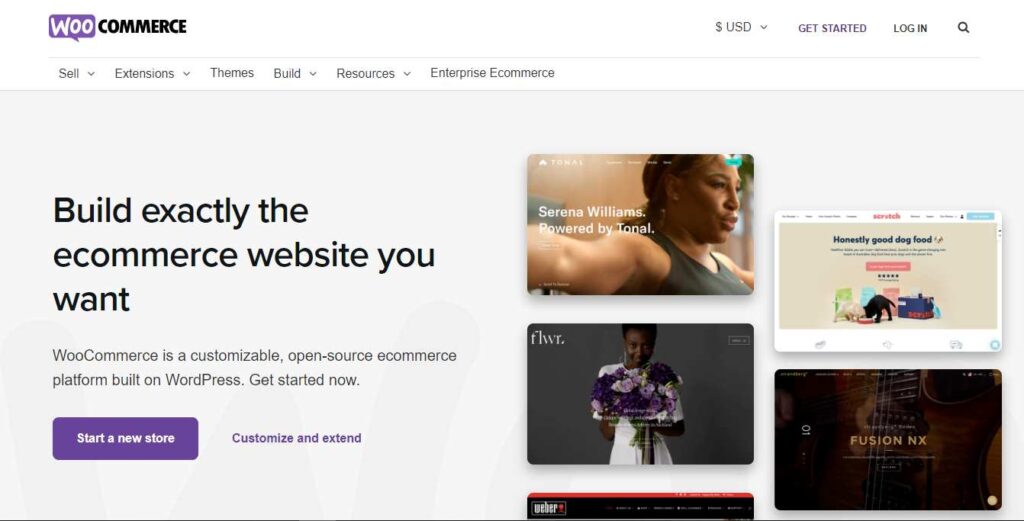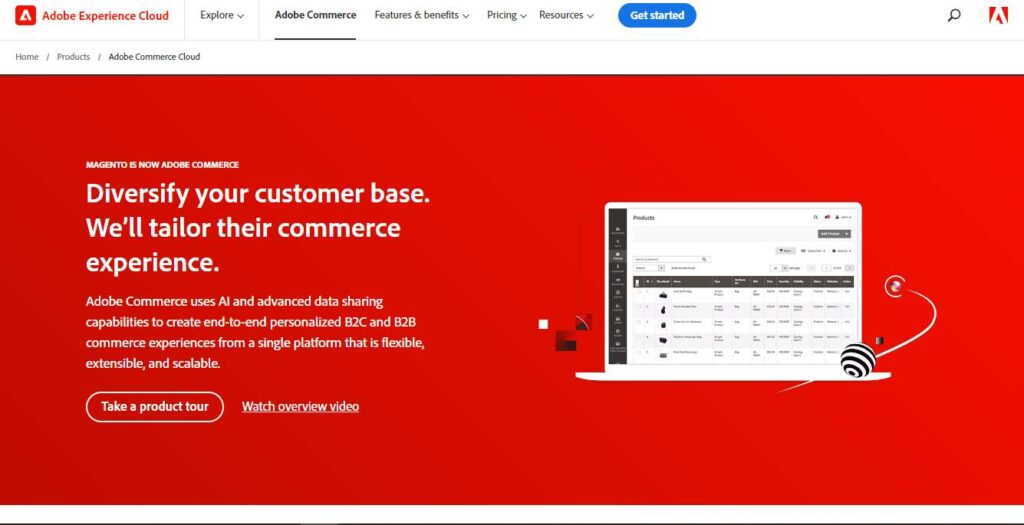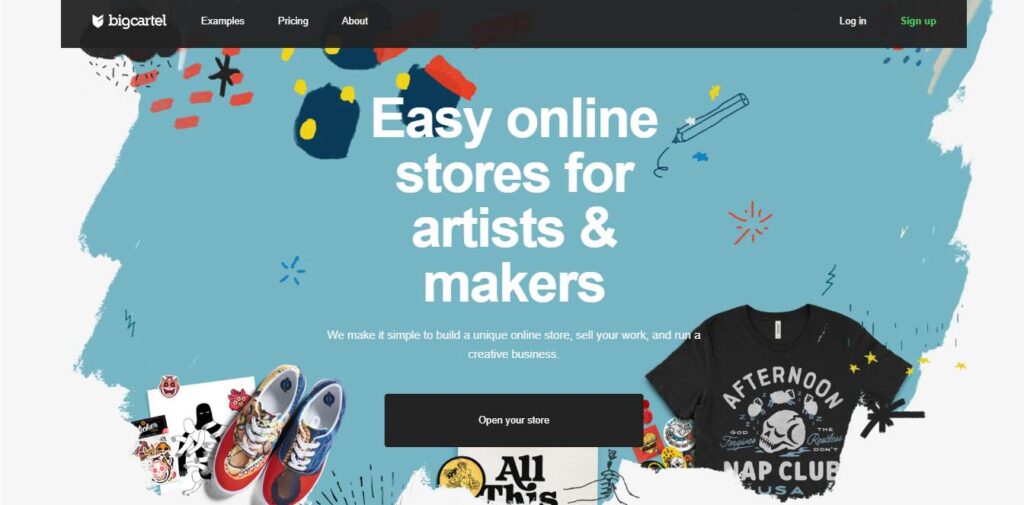Page Contents
Best Shopify alternatives are a great option for online store owners who are looking for more flexibility, features, and customization options. Shopify is an excellent platform for building an online store, but it may not suit everyone’s needs.
Shopify is a powerful e-commerce marketing tool that offers a range of features and benefits for businesses of all sizes. But for many reasons, you might want to switch to other alternatives,
In this article, we introduce the 9 best Shopify alternatives and introduce you to WatchThemLive, the first and best option to consider. WatchThemLive is a powerful and user-friendly eCommerce platform that offers a wide range of features.
So, keep scrolling to find out about the best Shopify Alternatives! But first, let’s go over the basics.
What Is Shopify
It’s a popular eCommerce platform that works best with website personalization tools and allows businesses to create and run their own online stores. It was founded in 2004 and has since grown into one of the most widely used eCommerce platforms in the world.
However, despite its popularity, Shopify has a number of disadvantages that users should be aware of before deciding to use it.
One of the biggest disadvantages of Shopify is the cost. While Shopify offers a range of pricing plans, the fees can add up quickly, especially for businesses that require additional features or add-ons. This can make it difficult for small businesses or startups with limited budgets to use Shopify.
Another issue with Shopify is that it can be limiting in terms of customization. While Shopify offers a range of templates and themes, it can be difficult to make significant changes to the design or functionality of the store without hiring a developer. This can be a major drawback for businesses that want to create a unique online presence.
Additionally, Shopify’s transaction fees can be a significant expense for businesses. While Shopify’s transaction fees are lower than those of some other e-commerce platforms, they can still add up quickly, especially for businesses that sell high-ticket items or have a large volume of sales.
Finally, some users may want to switch to other Shopify alternatives because this platform is heavily dependent on apps and add-ons to provide certain functionality.
This can make it difficult for businesses to manage their online stores, as they may need to use a variety of different apps and services to get the features they need.
Now, let’s take a look at some of the other best Shopify alternatives on the market! So don’t get disheartened and keep reading.
9 Best Shopify Alternatives
While Shopify is a popular e-commerce platform, it has several disadvantages that users should be aware of. High costs, limited customization options, transaction fees, and a heavy reliance on apps and add-ons can make Shopify less appealing for some businesses and may lead them to consider switching to other e-commerce alternatives.
In this article, we’ve explored 9 of the best Shopify alternatives available, each with its own unique features, and pricing plans. These alternatives are:
#1 Shift4Shop


Shift4Shop is an all-in-one eCommerce platform that allows businesses to create and manage their very own online store. It was launched in 1997 under the name of “3Dcart,” but in 2020 it rebranded to “Shift4Shop” after being acquired by Shift4 Payments, a payment processing company.
The platform offers a range of features, including website design tools, payment processing, marketing, shipping, and inventory management. It also provides integration with various third-party applications, such as QuickBooks, Amazon, and eBay.
Overall, Shift4Shop may be a suitable eCommerce platform for small to medium-sized businesses looking for a comprehensive solution to manage their online store. However, larger businesses may find more cost-effective options with more customization options.
Pros
- Wide range of features for building and managing an online store,
- Integration with third-party applications,
- Payment processing is included in the platform,
- Offers 24/7 customer support.
Cons
- Steep learning curve for beginners,
- Limited design options compared to other eCommerce platforms,
- Relatively high pricing plans for larger businesses,
- Transaction fees apply for using external payment processors.
Now let’s get to the next platform on our best Shopify alternatives!
#2 WooCommerce


WooCommerce is a popular open-source e-commerce plugin for WordPress websites. It enables businesses to easily set up and manage an online store, including product listings, inventory management, and payment processing.
One of the benefits of WooCommerce is that it’s free to use, making it an attractive option for small businesses and entrepreneurs who are just starting out.
It also offers a range of extensions and plugins that can be used to add additional functionality to the store, such as email marketing integration, product reviews, and social media integration.
However, WooCommerce may not be the best fit for every business. It requires a certain level of technical expertise to set up and customize, so businesses without this expertise may find it difficult to use.
Additionally, while the base plugin is free, businesses may end up spending money on additional extensions and hosting fees, which can add up over time.
Ultimately, whether or not WooCommerce is the right choice for your e-commerce business depends on your specific needs and resources. It’s important to do your research and consider all of your options before making a decision.
Pros
- Free and open source,
- Flexible and customizable,
- Wide range of extensions,
- Built-in payment processing.
Cons
- Requires technical knowledge,
- Additional costs,
- Security concerns,
- Limited support,
- WordPress compatibility issues.
#3 Magento


Magento is a well-known e-commerce platform launched in 2008. It is an open-source platform that allows businesses to create and manage online stores.
It offers a variety of customizable options to businesses. It is a flexible platform that supports both small and large businesses. Magento is known for its vast array of features such as multi-store support, mobile user experience, and advanced SEO options.
Pros
- Customizability,
- SEO-friendly,
- Multi-store support.
Cons
- Complexity,
- Cost,
- Technical knowledge.
#4 BigCommerce


BigCommerce is an e-commerce platform that offers a variety of features and tools for businesses to create and manage their online stores. It is a cloud-based platform, which means that businesses can access it from anywhere and do not need to install any software.
Pros
- Ease of use,
- Scalability,
- Customization,
- Integration with third-party tools.
Cons
- Limited design options,
- High pricing,
- Limited support options,
- Transaction fees.
#5 Volusion


Volusion is a cloud-based e-commerce solution designed to help businesses design, launch and manage personalized e-commerce websites using custom domains and personalized themes. The platform comes with a built-in content editor, which allows organizations to add or update text content and images across the website.
Volusion lets users create custom product category pages, add subcategories and handle search engine optimization (SEO) to improve promotion. Features include a CSS editor, inventory monitoring, search capabilities, barcode generator, pricing management, tax rate calculator, and ROI tracking.
Additionally, role-based permissions allow managers to provide restricted access to employees, view admin history and track changes across the online store. Also, its user-friendly interface allows store owners to avoid shopping cart abandonment.
Pros
- User-friendly,
- Customizable,
- Integrations,
- Mobile-friendly.
Cons
- Limited design options,
- High pricing,
- Limited support,
- Transaction fees.
#6 Squarespace


Squarespace is a website builder and hosting service that allows users to create professional-looking websites without the need for extensive coding skills. It was founded in 2003 and has since become a popular platform for small businesses, artists, and creatives.
Pros
- User-Friendly Interface,
- Beautiful Templates,
- Mobile Responsiveness,
- E-Commerce Integration,
- Customer Support.
Cons
- Limited Customization Options,
- Pricey Subscription Plans,
- Limited Integrations,
- Lack of Control,
- Steep Learning Curve.
#7 Wix


Wix is a popular website builder that allows users to create stunning websites without the need for extensive coding skills. Founded in 2006, Wix has become a go-to option for small businesses, creatives, and individuals looking to establish an online presence quickly.
Wix’s user-friendly interface makes it easy for beginners to create a website quickly. However, Wix has some limitations that might not fit your market research strategies. Users should be aware of them before deciding to use them.
For example, the design flexibility is limited compared to other website builders, and users may find it challenging to make significant changes to their website’s design. Additionally, advertisements appear on free plans, which can be distracting for users and potentially deter visitors.
Pros
- User-Friendly Interface,
- Customizable Templates,
- Mobile-friendly,
- Integration,
- App Market.
Cons
- Limited Design Flexibility,
- Advertisements on Free Plans,
- Slow Loading Times,
- Limited SEO Options,
- Limited Scalability.
#8 Big Cartel


Big Cartel is an e-commerce platform that allows artists and creatives to set up an online store to sell their products. It was founded in 2005 and has since become a popular option for small businesses looking for an affordable and easy-to-use e-commerce solution.
Big Cartel’s affordable pricing makes it an attractive option for small businesses and artists looking to sell their products online. However, Big Cartel does have some limitations that users should be aware of.
Pros
- Affordable Pricing,
- User-Friendly Interface,
- Customizable Templates,
- Inventory Management,
- No Transaction Fees.
Cons
- Limited Features,
- Limited Customization Options,
- Limited Integrations,
- No Built-in Blog,
- Limited Customer Support.
#9 PrestaShop


PrestaShop is a free and open-source e-commerce platform that allows users to create an online store quickly and easily. Founded in 2007, PrestaShop has become a popular option for small and medium-sized businesses looking to establish an online presence.
One of PrestaShop’s significant advantages is that it is open-source, meaning that users have access to the platform’s source code, allowing them to customize their online store to their preferences.
PrestaShop’s integrations with third-party services are limited, which may hinder users’ ability to add more functionality to their online store.
Here’s a list of this platform’s pros and cons:
Pros
- Open-Source,
- User-Friendly Interface,
- Customizable Templates,
- Multi-Lingual Support,
- No Transaction Fees.
Cons
- Limited Customer Support,
- Limited Integrations,
- Limited Scalability,
- Limited SEO Options,
- No Built-in Blog.
Why consider alternatives to Shopify
While Shopify is a powerful eCommerce platform, there are several reasons why you might want to consider using an alternative. One of the most common reasons is cost.
While Shopify offers a range of pricing plans, it can still be expensive for some businesses, particularly those that are just starting out. Additionally, Shopify takes a percentage of each transaction made on your store, which can eat into your profits over time.
Another reason to consider alternatives to Shopify is customization. While Shopify does offer a range of templates and themes that you can use to customize your store’s design, it can be difficult to create a truly unique and branded online store, and your exit rate might increase.
Alternative platforms may offer more customization options or allow you to work with a designer to create a completely custom store design.
Finally, some businesses may need specific features or functionality that Shopify does not offer. For example, if you sell digital products or subscriptions, you may need an eCommerce platform that is specifically designed for these types of products.
In these cases, it’s worth considering alternatives to Shopify that may better suit your business needs.
How to choose the best Shopify alternative for your business
When it comes to choosing the best Shopify alternative, there are several factors to consider. First and foremost, you need to consider your business needs.
What features and functionality do you need from your eCommerce platform? Do you need advanced marketing tools, inventory management, or integrations with other software tools?
You should also consider your budget. While some Shopify alternatives may be more affordable than Shopify, others may be more expensive. You need to find a platform that offers the features you need at a price point that is sustainable for your business.
You should consider the platform’s ease of use and level of support. A good eCommerce platform should be easy to use, even if you don’t have any prior experience with eCommerce.
Additionally, you should look for a platform that offers strong customer support, including resources like documentation and live support.
You should also pay close attention when it comes to comparing the pricing and features of each Shopify alternative.
When doing so, it’s important to consider both pricing and features. Some platforms may offer more features than Shopify but at a higher price point. Others may be more affordable, but may not offer the same level of functionality as Shopify.
When looking at pricing, it’s important to consider both the upfront cost and any ongoing costs, such as transaction fees or hosting fees. Some platforms may offer a lower upfront cost but may charge more in transaction fees, which can add up over time.
In terms of features, you should consider what features are most important for your business. Do you need advanced marketing tools, or are you primarily focused on inventory management? Do you need a platform that is highly customizable, or are you looking for something that is easy to use out of the box?
By comparing the pricing and features of each Shopify alternative, you can find a platform that meets your business needs while also staying within your budget.
People Also Asked About Best Shopify Alternatives
In this article, we introduced the 9 best Shopify alternatives and explained each of their features. Now it’s time to go over some frequently asked questions:
Q1. Are There Any Shopify Alternatives That Are Completely Free to Use?
Answer: Yes, there are some eCommerce platforms that offer free plans, although these plans may come with limited features or transaction fees. For example, platforms like WooCommerce and Square Online offer free plans with the option to upgrade to paid plans for additional features.
Q2. How Do I Migrate My Store From Shopify to a Shopify Alternative?
Answer: The process for migrating your store from Shopify to a different eCommerce platform will depend on the specific platforms involved.
However, in general, you’ll need to export your product data and customer information from Shopify and import it into your new platform. You may also need to recreate your store design and set up payment and shipping options.
Q3. Can I Still Use Shopify’s Payment Gateway If I Switch to a Shopify Alternative?
Answer: No, Shopify’s payment gateway is only available to merchants who use Shopify as their eCommerce platform. However, most Shopify alternatives offer their own payment gateways or integrate with third-party payment processors like Stripe or PayPal. You’ll need to check with the specific platform you’re considering to see what payment options are available.
Final Verdict
In conclusion, when it comes to finding the best Shopify alternatives, there are plenty of options to choose from. Each platform offers unique features and benefits that can help you create a successful online store.
Whether you’re looking for a platform that is easy to use, highly customizable, or provides advanced marketing tools, there is a platform out there that can meet your needs.
However, if you’re looking for a comprehensive and affordable alternative to Shopify, WatchThemLive may be the best choice for you. Its unique features and affordable pricing make it an attractive option for small and medium-sized businesses that are looking to grow their online presence.
Stand on top of the competition by signing up today for FREE!

